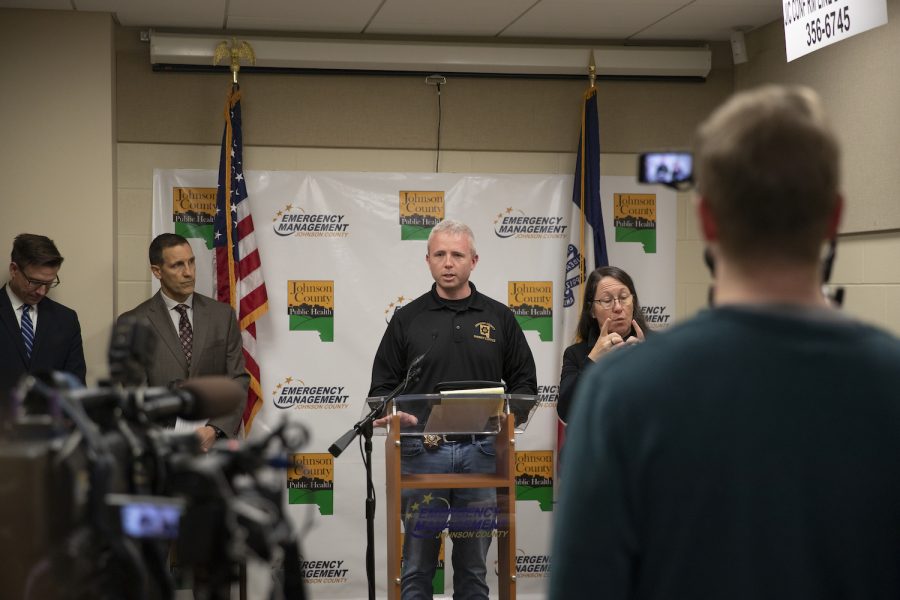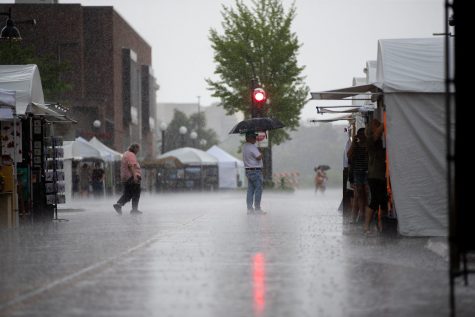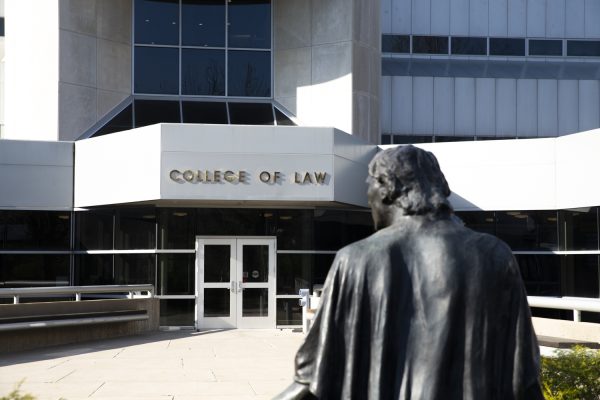Iowa law-enforcement officials make changes to prevent COVID-19 outbreak in Johnson County jail, correctional facilities
In response to concerns about how to best protect incarcerated individuals from COVID-19 in their close proximity, Iowa City police, Johnson County Jail, and the Iowa Department of Corrections are making changes to mitigate potential spread of the virus.
Johnson County Detective Sgt. Brad Kunkel during a press conference about COVID-19 at the Joint Emergency Communications Center in Thursday, March 12, 2020. Kunkel said that jails are screening inmates and arrestees and are watching for signs of COVID-19 that would warrant further screening. (Hayden Froehlich/The Daily Iowan.)
April 9, 2020
Some police officers continue to patrol the streets of Iowa City, while others are on-call from their homes in case of an emergency as law-enforcement officials grapple with the effects of COVID-19 on their jobs.
As the number of local, physical arrests decreases, arrested individuals who do not present immediate danger to the public are being released instead of admitted to Johnson County jail, to minimize the risk of bringing COVID-19 into the facility.
At the nine correctional facilities within Iowa, visitation from friends, family, and loved ones has halted entirely. Law enforcement, correctional officers, and staff self-monitor their temperatures and any potential symptoms of the novel coronavirus, to prevent infection of inmates or each other.
“They’re providing just excellent service out there on the front lines every day in an environment where most people wouldn’t want to be walking into,” Cord Overton, public information officer for the Iowa Department of Corrections, said about the staff.
Concern surrounding the unique challenges that come with controlling the pandemic in correctional facilities have persisted since the start of the outbreak.
According to the Centers for Disease Control and Prevention, the daily entrance and exit of staff, close quarters, and high turnover in jails, and additional issues are all opportunities for COVID-19 to infect crowded jails and prisons.
There are a little more than 30 inmates are in the Johnson County jail, according to an online roster. At the Oakdale Prison in Coralville, there are 840 inmates, far overshooting the capacity for the prison, which is listed at 585. Eleven are in the facility’s forensic hospital.
While no reported outbreaks have occurred in Iowa’s correctional facilities thus far, members of law enforcement and staff in those facilities are still taking precautions.
For the Iowa City police, this means that more cases of “cite and release” and less interpersonal contact.
RELATED: Delivery drivers work on the front lines of COVID-19 pandemic
Iowa City police public-information officer Sgt. Derek Frank said a mandate from Iowa Gov. Kim Reynolds allows a “cite and release,” or a citation instead of arrest for serious and simple misdemeanors.
“When we can, and it’s not going to put the public or anyone else in jeopardy of their safety, then we will do a whole lot more citing and releasing,” Frank said. “Because we don’t want to take people into the jail. That is potentially a Petri dish where the disease could spread.”
For instance, in a case such as theft, it could be a cite and release depending upon the value of the items that were stolen, Frank said. In cases that put people in danger such as assault, however, the procedure would still be the same, he said.
Detective Sgt. Brad Kunkel, public-information officer for the Johnson County Sheriff’s Office, said a screening process for incoming arrestees includes taking their temperatures and asking questions related to exposure to check for risk factors.
Inmates are encouraged to practice proper hygiene, Kunkel said. Staff in the correctional facilities have made cleaning and sanitation a top priority, as they continue to work with the County Attorney’s Office and the court system to reduce the overall number of inmates in the jail.
In the event of an outbreak within the Johnson County Jail, Kunkel stated that it would follow the recommendations of the Iowa Department of Public Health.
“We have the capacity to isolate some inmates,” Kunkel said. “But right now, our efforts are more focused on just prevention. That’s the top priority.”
Iowa is home to nine penitentiaries, each with various capacities and security levels. All visitation has been suspended because of COVID-19 since March 14 — the same day Reynolds confirmed community spread of the virus, or transmission of the virus from an unknown source.
Overton said there are tens of thousands of visits to the facilities per year from friends, family, and loved ones on the outside, but stopping them was necessary to prevent community spread.
“Making the decision to have to suspend that service is not something we do lightly as a department, because it seriously impacts the morale of the incarcerated folks as well as the kind of culture inside the prison,” Overton said.
To accommodate for the lack of in-person visits, the Iowa Department of Corrections has set up three free “O-Mails,” or a type of email between the incarcerated and the outside, and a free, five-minute phone call.
Although video-visitation services were not offered before the pandemic, the Iowa Department of Corrections is working with Google to establish a temporary service for it. Overton says he hopes the solution will be available statewide soon.
Overton added that the department is trying to be conscious of the culture within the prisons and aid any increased anxiety that inmates may be feeling. This requires constant communication with the incarcerated population, and efforts like videos from the head of the medical division in the department to go out to inmates.
“I think those incarcerated have a good understanding of how serious the situation is,” Overton said.
Overton said the Iowa Department of Corrections had a very robust and well-known pandemic-response plan before the COVID-19 outbreak from dealing with the flu previously. The plan could be customized and updated for the coronavirus crisis.
Additional changes in correctional facilities include ensuring that inmates have access to as much soap as they need and to hand sanitizer a substance that inmates are not normally given because it can be abused.
Overton described maintaining social distance within the correctional facilities around the state as “definitely a challenge.” It cut down on any situations that involve large group gatherings, Overton said, including recreational time, mealtime, and treatment groups.
In regard to housing assignments, Overton said the department is maximizing any existing space and has set up areas for individuals who may test positive for COVID-19. With the system already 20 percent overcapacity, he said the department must work with physical limitations of space.
“It’s a reality we’re living with and trying to deal with as best as we can,” Overton said.















